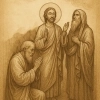Tag: Spiritual Connection

Why Do Christians Celebrate Christmas?
Christmas is one of the most widely celebrated holidays in the world, bringing together people of all backgrounds to commemorate the birth of Jesus Christ. But why exactly do Christians celebrate Christmas? Let’s explore the origins, biblical basis...

The Olive Tree: Its Symbolism and Meaning in the Bible
The olive tree holds profound significance in the Bible, embodying peace, prosperity, divine favor, and resilience. This sacred tree is not only one of the most frequently mentioned plants in the Scriptures but also plays a central role in the cultur...

10 Reasons Why the Bible is Still Worth Reading Today
In an era marked by technological advancements and a rapidly changing cultural landscape, the Bible remains a timeless and influential source of wisdom and guidance. While some may argue that its relevance has diminished, here are 10 reasons why the ...
About
Welcome to Free Bible: Unearthing the Past, Illuminating the Present! Step into a world where ancient history and biblical narratives intertwine, inviting you to explore the rich tapestry of human civilization.
Discover the captivating stories of forgotten empires, delve into the customs and cultures of our ancestors, and witness the remarkable findings unearthed by dedicated archaeologists.
Immerse yourself in a treasure trove of knowledge, where the past comes alive and illuminates our understanding of the present.
Join us on this extraordinary journey through time, where curiosity is rewarded and ancient mysteries await your exploration.
Recent posts
-

Prayers for Prophets: A Reflection on Reverence and Intercession
Prophets hold a revered status across many of the world’s major religions. As individuals chosen to convey divine messages, they are often remembered with deep respect, veneration, and love. One of the most profound ways believers express their connection to prophets is through prayers—supplications made for, to honor, or inspired... -

The Bible in Museums: Where to See Ancient Scripture Today
The Bible, as one of the most influential books in human history, has shaped not only religious beliefs but also the course of civilization. Its stories, teachings, and moral lessons have impacted art, literature, law, and culture for centuries. Today, while many people engage with the Bible through modern translations... -

Archaeologists Uncover Possible Oldest 3D Map, Dating Back 13,000 Years
A team of archaeologists has identified what may be the world’s oldest known three-dimensional map, according to a new study. The discovery was made at Ségognole 3, a prehistoric sandstone rock shelter located south of Paris, France. While the site has been known since the 1980s for its ancient engravings—including depictions... -

Archaeologists Discover 3,500-Year-Old Tomb of ‘Missing Pharaoh’ in Egypt
Burial Site of Thutmose II Hailed as the Most Significant Find Since Tutankhamun British archaeologist Piers Litherland had spent over a decade exploring the remote western wadis near Egypt’s Valley of the Kings when he made a breathtaking discovery—an ancient staircase leading to a long-lost royal tomb. What he and his... -

Ancient Jewish Ritual Bath Unearthed Near Rome Sheds Light on Jewish Life in the Roman Empire
Archaeologists in Italy have uncovered the remains of an ancient Jewish ritual bath, or mikveh, near Rome, marking the oldest known discovery of its kind outside the biblical regions of Israel and its surroundings. The mikveh was found during an ongoing excavation in Ostia Antica, an ancient port city located 16...
Main Menu
- Ancient Assyrian Social Structure
- Ancient Babylonia
- Ancient Canaan During the Time of Joshua
- Ancient History Timeline
- Ancient Oil Lamps
- Antonia Fortress
- Archaeology of Ancient Assyria
- Assyria and Bible Prophecy
- Augustus Caesar
- Background Bible Study
- Bible
- Biblical Geography
- Fallen Empires - Archaeological Discoveries and the Bible
- First Century Jerusalem
- Glossary of Latin Words
- Herod Agrippa I
- Herod Antipas
- Herod the Great
- Herod's Temple
- High Priest's in New Testament Times
- Jewish Literature in New Testament Times
- Library collection
- Map of David's Kingdom
- Map of the Divided Kingdom - Israel and Judah
- Map of the Ministry of Jesus
- Matthew Henry Bible Commentary
- Messianic Prophecy
- Nero Caesar Emperor
- Online Bible Maps
- Paul's First Missionary Journey
- Paul's Second Missionary Journey
- Paul's Third Missionary Journey
- Pontius Pilate
- Questions About the Ancient World
- Tabernacle of Ancient Israel
- Tax Collectors in New Testament Times
- The Babylonian Captivity
- The Black Obelisk of Shalmaneser
- The Books of the New Testament
- The Court of the Gentiles
- The Court of the Women in the Temple
- The Destruction of Israel
- The Fall of Judah with Map
- The History Of Rome
- The Incredible Bible
- The Jewish Calendar in Ancient Hebrew History
- The Life of Jesus in Chronological Order
- The Life of Jesus in Harmony
- The Names of God
- The New Testament
- The Old Testament
- The Passion of the Christ
- The Pharisees
- The Sacred Year of Israel in New Testament Times
- The Samaritans
- The Scribes
Ancient Questions
- How did the ancient Greeks and Romans practice medicine and treat illnesses?
- How did the Ancient Greeks and Romans view education and the role of philosophers?
- What Weapons did the Roman Soldier Carry?
- How did the ancient Mayans develop their sophisticated calendar system?
- How did ancient Egyptians mummify their dead?
- What was the Wilderness of Judea?
- Is the Black Sea Mentioned in the Bible?
- Who were the Main Historical Sources for the Life of Nero?
- What was an Alabaster Jar?
- Who Were the Main Powers in Italy Before the Roman Empire?
Bible Study Questions
- How can we apply biblical principles to our daily lives?
- Exploring the English Standard Version (ESV): Its Aspects, Comparisons, Impact on Biblical Studies, and Church Use
- The Christian Standard Bible (CSB): An In-Depth Analysis
- The King James Version (KJV): Textual Basis, Impact on English Literature, and Role in the History of Bible Translations
- How do we discern false teachings or heresies in light of biblical truth?
- A Detailed Historical Analysis of Amplifications in the Amplified Bible (AMP) and Its Comparison to Other Bible Translations
- What is the significance of the Ten Commandments?
- What is the role of faith in the life of a believer?
- The Revised Geneva Translation (RGT): Specific Aspects, Comparison to the King James Version, Impact on Bible Memorization, and Theological Distinctives
- The New Life Version (NLV): Simplified Language and Comparisons with Other Easy-to-Read Bible Translations